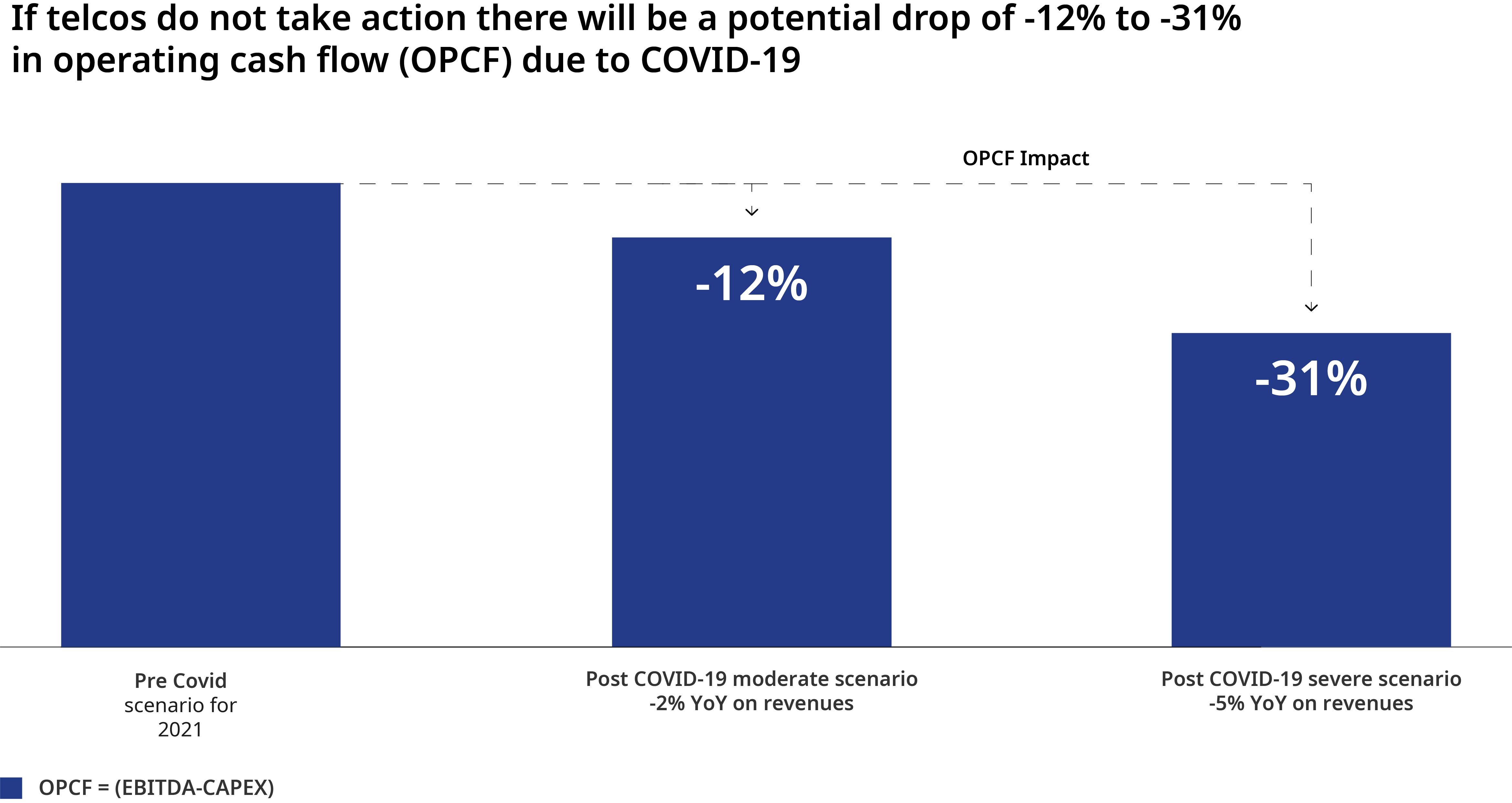This article was first published on June 23, 2020.
Telcos around the world have now dealt effectively with the COVID-19 pandemic, ensuring service continuity through sharp traffic increases without much disruption. Now they must decide how to deal with a difficult, potentially lasting, aftermath: a severe economic recession, notable shifts in customer preferences, and an uncertain path back to normality. Cracking on with pre-pandemic plans seems unrealistic, but what specifically should be changed?
Most operators now expect revenue underperformance of 2 to 5 percent compared to their prepandemic plans in 2020-21. While this is a far cry from what airlines or restaurants are in for, it is not immaterial: We stress tested the world’s top 70 telcos (around 75 percent of the industry) for a 2-to-5-percent revenue hit and found that operating cash flow will degrade 12 to 31 percent if nothing is done — clearly not an acceptable outcome for shareholders and management.
Exhibit 1:

Source: Oliver Wyman analysis
Thus, operators now have some rethinking to do. The winners will be the ones that best and most quickly adapt their strategies and operations to a tougher, and different, business environment. By adapting, we mean reconsidering how to serve customers with shifting priorities, how to compete against other telcos, how to run day-to-day operations, and how to deploy capital. We briefly explore these four ideas below.
1. Support Customers As Their Needs Evolve
The same customers can’t be expected to behave the same. The downturn will create pressure on average revenue per user (ARPU) and from churn, as struggling households demand lower-cost plans, discontinue non-essential services, renew their devices less regularly, and hunt for better deals. Businesses will try to decrease their telecom spending, and some will go bankrupt. More customers will default on their payments. Despite these challenges, there will be opportunities to boost customer engagement, satisfaction, and loyalty.
Additionally, new behaviors will emerge in a society living with COVID-19. Most of us have gotten used to working, learning, and playing remotely, and to interacting digitally with our suppliers. We might move less, touch less, and trust less going forward, and we might focus more on health, safety, and the basics of life. Businesses will be challenged, but some will need more connectivity, cloud, and cybersecurity. This will create opportunities which will require innovation and creativity to seize.
In this context, we believe that retaining customers and cementing their loyalty will be much more important than acquiring new ones. Dealing with downgrades well, using flanker brands proactively, and supporting customers in difficult times are going to become key, while operators innovate to serve new customer needs so that they can later rebuild ARPU faster than competitors.
2. Compete Rationally
With the world almost closed for business for a while, the pressure is now mounting for a sharp
reboot of commercial activity. Challengers will lure customers from incumbents based on price; customers will demand discounts or downgrades; churn will be back; and the temptation will be strong to push aggressive acquisition offers to compensate for lost ARPU and lost customers. (Spoiler: It can’t be done.)
The ingredients for new price wars in telco are thus here and, as happened during the global financial crisis of 2008, operators’ response to the pandemic might actually be more damaging to their business than the demand shock induced by the crisis in the first place.
For most operators, then, a better path than just pumping up the sales machine might come from competing rationally and focusing on things like serving their existing base through the downturn, gaining share of wallet, adapting channel mix (and channel spending) to shifting customer preferences, and rationalizing commercial investment.
3. Go Digital, At COVID-19 Speed
Since the world went into lockdown and society was forced into a hyper-digital, no-touch lifestyle, most telecom operators have seen their customers, employees, and suppliers quickly embrace new ways of interacting and working. Digital transactions exploded; customers got more-than decent service without shops or home visits; and the workforce swiftly adopted telecommuting. More progress towards a digital operating model was probably made in one quarter than in the previous five years.
The question now is: Can it continue to go faster? Many operators we work with are rethinking three aspects of the journey. First, to force a shift in the channel mix while channels are still disrupted, they are reconsidering shop capillarity and critically reviewing reopening plans and indirect channel relationships. In parallel they are fast-tracking digital-first customer experiences and promoting apps as the primary means to cross-sell, up-sell, and reprice and to retain and service customers — all zero-touch.
Second, they are using the back-to-basics element of this crisis to simplify products, channels, and end-to-end operations aggressively, decreasing organizational entropy and reducing cost. Linked to simplification, a renewed focus on cost saving is essential to provide relief for operating cash flow without putting all the burden on commercial activity or capital expenditure (CAPEX).
Third, they are rethinking their workforces, both internal and external. A work-from-home policy can indeed save money; but more importantly, it unveils interesting learnings about productivity, the value of certain tasks, or the limits to organizational complexity that many telcos are only starting to explore as they plan for their workforces of the future.
4. Rethink CAPEX
In a recessionary environment, conservative cash management is imperative. In the capital-intensive industry that telecoms is, this means at least reconsidering how much CAPEX will be deployed in the next couple of years and what for.
If used discretionarily, capital spending can be used to shield operating cash flow. In a typical operator, a reduction of four to eight percent in CAPEX is needed to offset a one-percent revenue hit by itself. While it would be ill advised to rely only on investment cuts, most operators Oliver Wyman works with are considering reductions following lowered expectations of return on investment (ROI). Several large telcos are assessing downward adjustments of two to four percentage points in CAPEX / revenue during the downturn, although these will vary greatly among markets.
CAPEX, however, is discretionary only to a limited extent, given that operators compete against each other by investing to create network parity or advantage. Thus, each needs to assess different paths to rationalize investments. In markets with high fiber penetration, slowing down 5G will be an option where it does not degrade mobile competitiveness. In areas with low competitive pressure in fixed line, slowing down fiber might be an option. Other ideas are on the table too, like co-investing with financial sponsors, infrastructure players, or competitors; pushing for relaxed coverage obligations or delayed spectrum auctions; and pruning CAPEX not essential for revenue competitiveness.
No-one really knows what the recovery will be like, but it is reasonable to assume this crisis will not leave things unchanged. Consistent with this, the best telcos around the world are now moving from impact estimation and short-term mitigation to rethinking their medium-term futures. We believe this is the responsible thing to do for all telecom managers out there.






